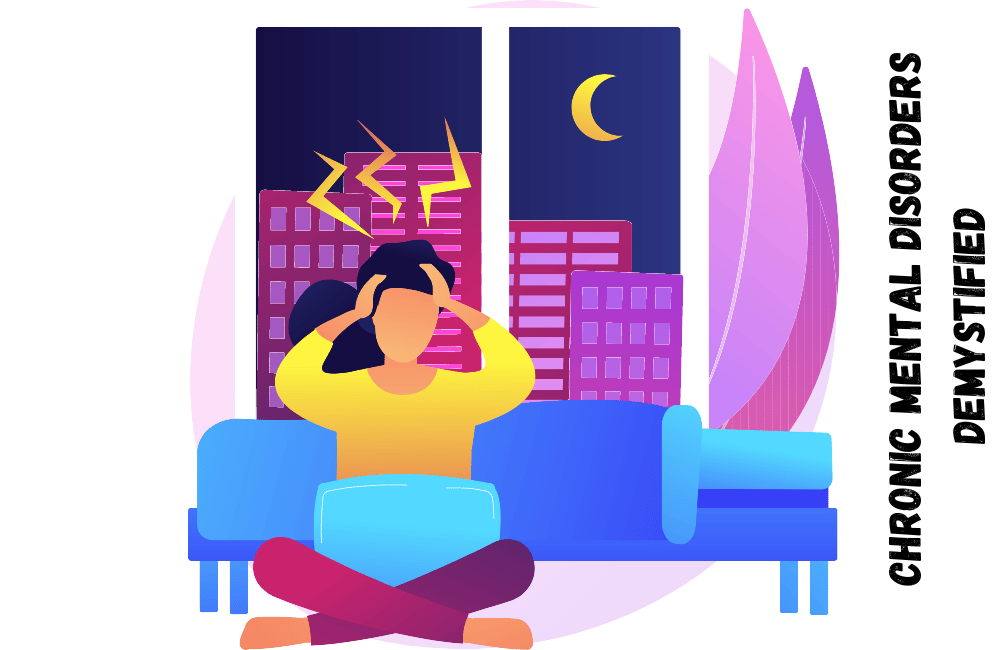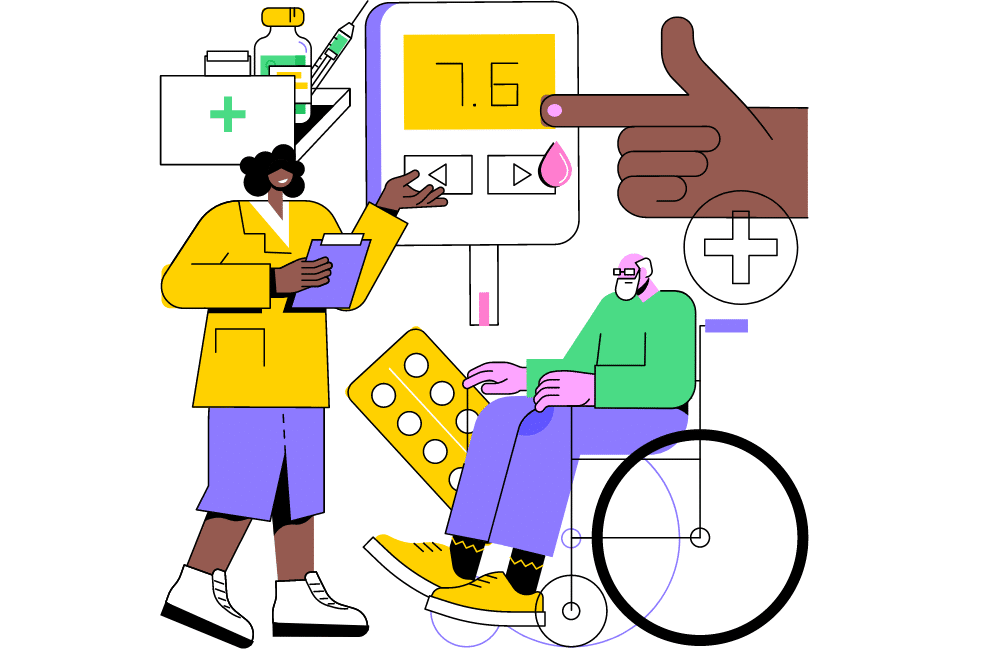Chronic mental disorders are a complex mental health condition category requiring long-term management and care. These disorders can significantly impact an individual’s thoughts, emotions, and behaviors, affecting their overall well-being and quality of life.

In this article, we will delve into chronic mental disorders, exploring their causes, symptoms, and available treatment options.
What Are Chronic Mental Disorders?
Chronic mental disorders, also known as chronic psychiatric conditions, refer to mental health conditions that are enduring and often last for an extended period, typically longer than six months. These disorders are characterized by persistent symptoms that can significantly impair an individual’s daily functioning and quality of life. Common examples of chronic mental disorders include major depressive disorder, bipolar disorder, schizophrenia, and obsessive-compulsive disorder.
Causes of Chronic Mental Disorders
Genetic Factors
Research suggests that genetics plays a significant role in developing chronic mental disorders. Certain genetic variations may increase an individual’s susceptibility to these conditions. While specific genes have been identified for some disorders, the genetic mechanisms underlying many chronic mental disorders are complex and still being studied.

Genetic factors contribute to the heritability of conditions such as bipolar disorder, schizophrenia, and major depressive disorder. Family and twin studies have shown a higher risk of developing these disorders among individuals diagnosed with close relatives. However, it’s important to note that genetic predisposition alone is not sufficient to cause a chronic mental disorder. Environmental factors also play a crucial role.
Environmental Factors
Adverse life events and environmental factors can contribute to the onset and development of chronic mental disorders. These factors include:
a) Trauma, Abuse, and Neglect: Experiencing trauma, physical or sexual abuse or neglect during childhood or adulthood can significantly increase the risk of developing chronic mental disorders. Traumatic events can disrupt the brain’s normal functioning and affect emotional regulation and cognitive processes.
b) Chronic Stress: Prolonged exposure to stress, such as ongoing financial difficulties, work-related stress, or relationship problems, can contribute to the development of chronic mental disorders. Chronic stress can lead to dysregulation of stress response systems in the brain, affecting mood, behavior, and overall mental well-being.
c) Substance Abuse: Substance abuse, including alcohol, drugs, or both, can contribute to the development or worsening of chronic mental disorders. Substance abuse can alter brain chemistry, leading to neurotransmitter imbalances and increased vulnerability to mental health conditions.
d) Social Isolation: Lack of social support and feelings of social isolation can have a negative impact on mental health. Humans are social beings, and social connections are vital in maintaining psychological well-being. Social isolation can increase the risk of developing chronic mental disorders, exacerbate symptoms, and hinder recovery.
- Neurochemical Imbalances: Neurochemical imbalances in the brain can contribute to the development of chronic mental disorders. Neurotransmitters, the chemical messengers in the brain, play a crucial role in regulating mood, cognition, and behavior. Imbalances in neurotransmitters, such as serotonin, dopamine, and norepinephrine, have been associated with various mental health conditions.
For example, low serotonin levels have been linked to depression, while abnormalities in dopamine function are implicated in conditions like schizophrenia. These imbalances can be influenced by both genetic and environmental factors, further contributing to the complexity of chronic mental disorders.
- Brain Structure and Function: Abnormalities in brain structure and functioning have been observed in individuals with chronic mental disorders. Advanced brain imaging techniques like magnetic resonance imaging (MRI) have provided insights into these structural and functional differences.
For instance, individuals with schizophrenia often show differences in brain structure, particularly in sensory processing, emotional regulation, and cognitive functioning regions. Similarly, in depression, alterations in the prefrontal cortex, amygdala, and hippocampus may be altered, which are important for mood regulation and emotional processing.
These brain irregularities can affect the transmission of signals between brain regions and impact various mental processes, leading to the development and manifestation of chronic mental disorders. However, it’s important to note that brain abnormalities are not the sole cause of these conditions, as they interact with genetic and environmental factors.
Understanding the complex interplay between genetic, environmental, neurochemical, and brain-related factors can contribute to a more comprehensive understanding of the causes of chronic mental disorders. Further research is ongoing to unravel the intricate mechanisms involved, potentially leading to improved prevention, diagnosis, and treatment strategies.
Symptoms and Signs of Chronic Mental Disorders
I. Persistent feelings of sadness, hopelessness, or emptiness (in depression)
- Fatigue or loss of energy
- Changes in appetite and weight
- Sleep disturbances
- Feelings of guilt or worthlessness
- Difficulty concentrating or making decisions
- Recurring thoughts of death or suicidal ideation
II. Extreme mood swings and energy fluctuations (in bipolar disorder)
- Euphoria or an abnormally elevated mood
- Increased energy and decreased need for sleep
- Racing thoughts or rapid speech
- Impulsivity and engaging in risky behaviors
- Grandiose beliefs or inflated self-esteem
- Poor judgment and difficulty focusing
- Irritability or agitation
III. Hallucinations, delusions, or disorganized thinking (in schizophrenia)
- Hallucinations
- Delusions
- Disorganized thinking
- Social withdrawal and reduced emotional expression
- Impaired cognitive function
IV. Intrusive thoughts or repetitive behaviors (in obsessive-compulsive disorder)
- Obsessions
- Compulsions
- Significant distress or impairment in daily functioning
V. Social withdrawal, decreased motivation or changes in appetite and sleep patterns
- Social withdrawal
- Decreased motivation
- Changes in appetite and weight
- Sleep disturbances
Treatment Options
- Medication: Psychiatric medications, such as antidepressants, mood stabilizers, and antipsychotics, are commonly prescribed to manage chronic mental disorders. These medications can help alleviate symptoms and stabilize mood and cognition.
- Psychotherapy: Various forms of psychotherapy, including cognitive-behavioral therapy (CBT), dialectical behavior therapy (DBT), and psychodynamic therapy, can effectively treat chronic mental disorders. These therapies explore thoughts, emotions, and behaviors and develop coping strategies.
- Lifestyle Changes: Adopting a healthy lifestyle can positively impact chronic mental disorders. Regular exercise, sufficient sleep, a balanced diet, and stress reduction techniques can improve overall well-being.
- Support Systems: Building a strong support network, including family, friends, and support groups, can provide emotional support and understanding, reducing feelings of isolation.
Final Thoughts
Chronic mental disorders are complex conditions that require comprehensive treatment approaches. It is essential to seek professional help if you or someone you know is experiencing symptoms of a chronic mental disorder. Early intervention and appropriate treatment can greatly improve the quality of life for individuals affected by these conditions. Remember, there is hope, and recovery is possible.
By providing accurate information and using proper SEO techniques, we hope this article helps raise awareness and understanding of chronic mental disorders, ultimately assisting those needing guidance and support.
FAQs – Frequently Asked Questions
What is a chronic mental disorder?
What are coping mechanisms that protect one’s mental health?
. Engaging in regular physical exercise to reduce stress and improve mood.
. Practicing mindfulness and relaxation techniques, such as meditation or deep breathing exercises.
. Building and maintaining a strong support network of family and friends.
. Pursuing hobbies and activities that bring joy and fulfillment.
. Seeking professional help through therapy or counseling when needed.
. Prioritizing self-care, including getting adequate sleep, eating a balanced diet, and setting healthy boundaries.
How common is chronic mental illness?
How does chronic illness affect mental health?
. Increased stress and anxiety due to the challenges and uncertainties associated with managing a chronic condition.
. Emotional distress, including feelings of sadness, frustration, or grief related to the limitations and impact on daily life.
. Social isolation or reduced social activities due to physical limitations or the need for extensive medical care.
. Changes in self-esteem and self-image, particularly if the chronic illness affects physical appearance or abilities.
. Development of mood disorders, such as depression or anxiety, as a result of the ongoing physical and emotional burden

